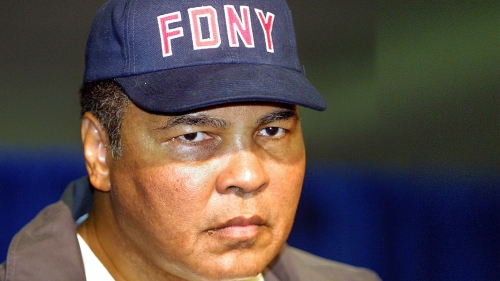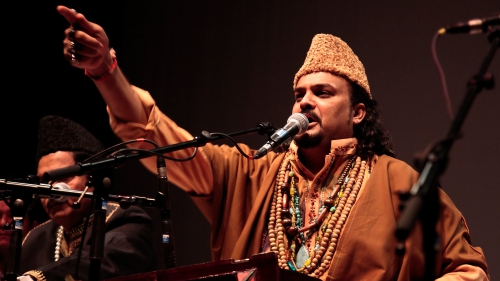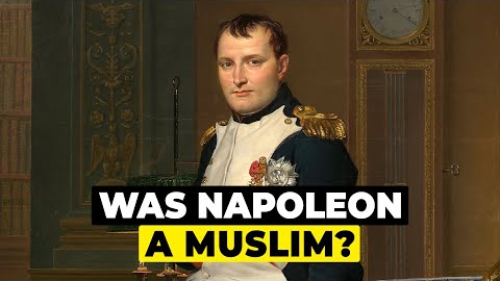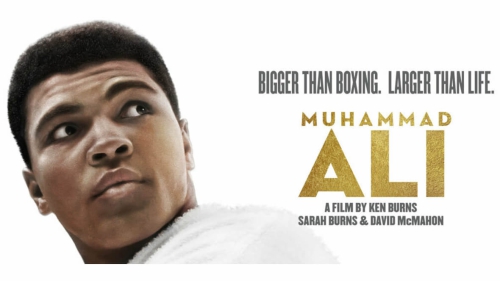Floating like a Butterfly to the great Beyond

The “greatest” returns to The ultimate Greatest.
The “greatest” has passed on. The unavoidability of death does not in any way reduce the loss of this great man and the nostalgia evoked by rumination of his memorable life. Being crowned Sportsperson of the 20th Century and having been the most recognized sports figure in history, does not capture the exceptionality of this global icon. In the apt words of boxing great, Manny Pacquiao; “Boxing benefited from Muhammad Ali’s many talents but not nearly as much as mankind benefited from his humanity.”
Morphing into a Butterfly
Ali was gifted with tremendous skill, stunning speed, exceptional timing, extra-ordinary intelligence, razor-sharp wit and astonishing courage. He grew from an impulsive, confident, young Cassius Clay into the thought-provoking, contentious civil rights activist, Muhammad Ali. Being motivated by social concern, enthused by political convictions and inspired by religious conscience led him to live a life where he had to make principled choices for which he had to bear severe consequences. He evolved into one who was audacious in the ring, eloquent on the air, inspirational to the young, compassionate to the needy, and patient in bearing the burden of his own life and the challenges of his health. An extraordinary genius with captivating charm, matchless magnificence and a fascinating sense of humor. He was indeed far beyond a boxing legend; he was a social fighter and most importantly an honorable and an exemplary human being.
He became the personification of “black pride”, the outspoken voice of integrity and though seemingly outrageous, he was actually the embodiment of humility. He thus became a champion inside the ring (beating the likes of Liston, Frazier and Foreman) and a hero beyond the ring (when he refused to fight in an unjustified war against Vietnam). Ali was then prevented from boxing at the pinnacle and prime of his athletic resplendence when his “greatest” years were denied to him. It was nonetheless his incomparable ethics, extra-ordinary technique and his audacity towards standing up for his beliefs that propelled him towards the legendary stature that became Muhammad Ali. That rare person who actually practiced what he preached, who triumphed over tribulations, transcended the boxing ring and became sports’ first real superstar. In reality, he became greater than his legend.
In honoring Muhammad Ali as The Greatest Athlete of the Century, USA Today's Jon Sareceno then wrote; "For nearly five decades this man has, in one arena or another, commanded our attention... and we are still mesmerized. He is a come-to-life definition of his Muslim namesake, Muhammad "worthy of praise" and Ali "most high".
Earliest Memories and Principled Support
It was early one February morning in 1964 when my late grandfather woke up the household in our family home in the little farm town of Vryburg in the north-western part of South Africa with an excited cry; "Clay has won”. Clay had defeated the unbeatable Liston. We huddled around the radio to hear Casius Clay announce that Liston promised to kill Clay and that Muhammad Ali was born. "I am now a Muslim", he said. As African we were proud of this "black" hero and as Muslims we were now honored that he was one of our faith.
As an ardent sports fan and a South African growing up through the most brutal part of the apartheid era, "black" heroes were made to be rare. Conscientious South Africans then never supported the racist "all white" South African teams and proudly stuck to the principle of “no normal sport in an abnormal society”'. We therefore tended to support West Indies in cricket and Brazil in soccer. What great joy Gary Sobers and Pele gave us.
When the sports heroes were Muslims, we felt even greater pride. I still recall those historic moments subsequent to that when Abdul Kareem Jabbaar of the LA Lakers was Most Valuable Player for the NBA in 71,72,73 and 74; Imran Khan lifted the World Cup Cricket trophy for Pakistan in Australia in 1994; when Hakeem Olajuwan led the Houston Rockets to basketball glory in 94-95, when Abdul Aziz Benazi led France to the 5 Nations Cup victory in 97; when Moroccans Hicham El-Gharouj and Khalid Khanouli broke the mile and marathon world records respectively; or when Zainedine Zaidan captained his team to World Cup victory in 1998 in France; all moments of glory embedded forever in our minds and fondly cherished in our hearts. So much so, that when families and friends gather to reminisce about the "good old days", these moments of sporting glory are often part of those memories.
The Ali Legacy
No athlete had a career so varied, so trying, so complex, so significant yet so little tainted by hypocrisy. Ali had the guts to take on his government when they undertook an unwarranted war in Vietnam, the courage of his convictions to lay down his title and go to jail for his beliefs, bold enough to accept the Islamic faith when it was least fashionable to be Muslim and humble enough to accept his shortcomings. He backed up his lips with actions, lost his title because he refused induction into the US army, always spoke his mind with eloquence, and in the process became the most famous person in the world. Oh yes, he was also the heavyweight boxing champion.
Yes, he said "I am the champ" and that was no lie. He said "I float like a butterfly and sting like a bee" and that was no lie. He outfoxed the Hare (Patterson), thumped the Bear (Liston), taught Ernie Terrel his Muslim name, gave us the Thriller in Manila (with Frazier) and the Rumble in the Jungle (with Foreman) in Zaire. Ah! How emotions were moved when he spoke, when he fought, when he won. How hurt we were when he lost. And yes, we remember how our heart danced with joy when he did the 'Ali shuffle'. His legacy is integrated into part of our collective history for all time. When we are located in history, it may one day be said that we lived at the time of Muhammad Ali.
Ali in the spotlight for over 50 years
Ali humanized our perception of athletes, brought pride to the Muslims and dignity to the oppressed black masses. He made people proud to be who they were; the more downtrodden, the more proud. Malcom X said; "Ali will mean more to people than any athlete before him". (How right you were Brother Malcom and we are eternally indebted to you for your positive influence).
Ali has remained in the spotlight for over 50 years with dignity, panache and flair. In those five decades that he has commanded our attention he gave us athleticism, artistry, accomplishment, alpha-star appeal and an ambassadorship for sports and Islam. Over 30 years after his last fight, he remained the most recognizable and adored person.
Global humanitarian ambassador for humanity to humanity
Ali has been an opening to something great, he spoke of the Divine and on behalf of the distressed, he spoke of the rights of the oppressed, gave charity to the hungry and the poor, and he cared for the sick, the old and gave hope to the downtrodden. He raised his game from a backroom sport to an engaging global drama. Whether in Harlem, Kinshasha, Manilla or Soweto; millions of fans cheered from their heart Ali ! Ali! Ali ! He stood for something great. As these admirers (many who were neither boxing enthusiasts nor sports fans) climbed on to their seats for him they felt that they were witnessing greatness on display and sporting poetry in action. They were energized by their hero. Sportswriter Brian Murphy never considered himself an Ali fan. But when he, like many people all over the world, watched as a physically humbled Ali lit the flame to begin the Atlanta Olympic Games in 1996 he said; "I suddenly felt something I never felt before. I loved him, not out of pity but out of respect. Ali was terribly controversial throughout his whole career, but he was authentic the whole way through. And controversial as he was, he never made you ashamed to be his fan."
His famous opponent, George Foreman told the BBC on the passing of Ali; “Part of me is gone. Muhammad Ali was one of the greatest human beings I have ever met. No doubt he was one of the best people to have lived in this day and age.”
Appearing at the 'Muhammad Ali World Healing Project' in 1997, Muhammad Ali said:
"I wish people would love everybody else the way that they love me. I hope I can encourage people to show the same love and respect for each other. If so, it would be a better world."
When asked recently how he would like to be remembered, he replied; "I would like to be remembered as a man who won the heavyweight title three times, who was humorous and who treated everyone right. As a man who never looked down on those who looked up to him...who stood up for his beliefs...who tried to unite all humankind through faith and love. And if all that's too much, then I guess I'd settle for being remembered only as a great boxer who became a leader and a champion of his people. And I wouldn't even mind if folks forgot how pretty I was.”
Hosting Ali in Cape Town
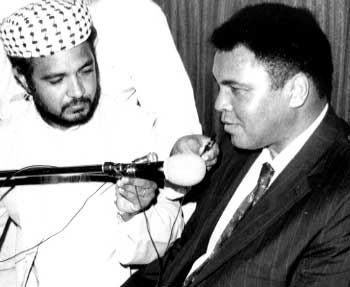
I had the privilege of hosting Muhammad Ali at Masjid-ul-Quds in Cape Town and honored with the task of introducing him to the congregation. Here was my sporting hero and a hero to so many people all over the world. He was by then (1994) an enlarged shadow of his former self yet he was considered the person that people worldwide would most like to meet.
When recently asked if he was "the greatest", Ali replied; "I ain't the greatest. Only Allah is the greatest. I gave myself a job. I work for Allah".
Indeed you did Ali, indeed you did, much more than all the sermons I could ever give in all the mosques. You have been used and abused, but be rest assured that someday when I sit with my grandchildren, God-willing, hearing them talk about their sporting heroes, I'll tell them of Muhammad Ali, the greatest sportsperson of all time that lived in our days. I'll say it with pride and without fear of contradiction.
Yes, My heart will always dance when I see the 'Ali shuffle' and I'll feel a knot in my throat and a tear in my eye whenever I hear your name ... Ali ! Ali ! Ali !
Topics: In Memory, Memorial, Muhammad Ali, Personality Values: Manners
Views:1958
Related Suggestions






